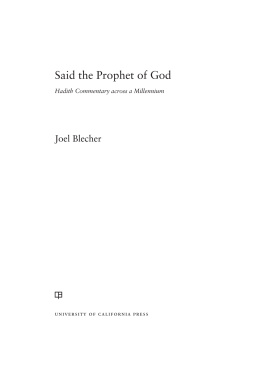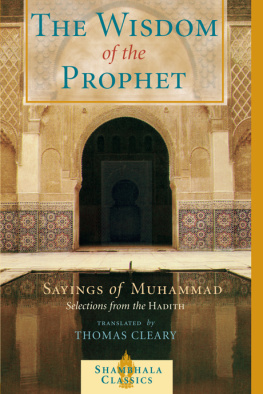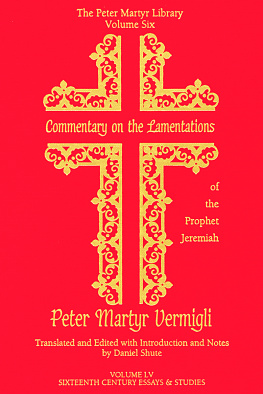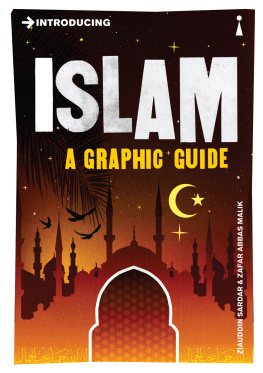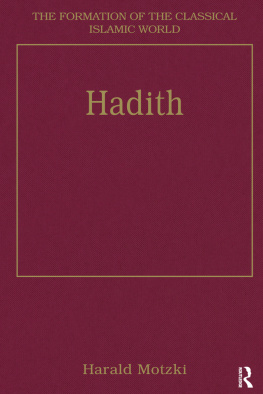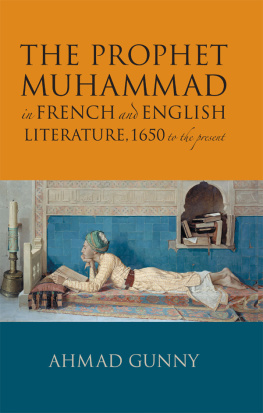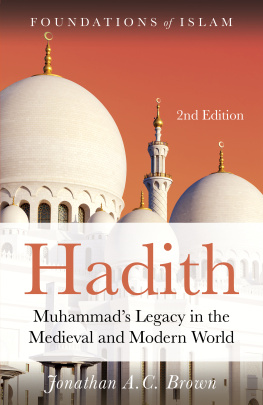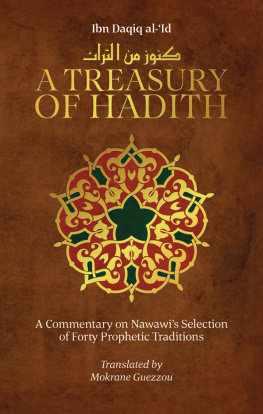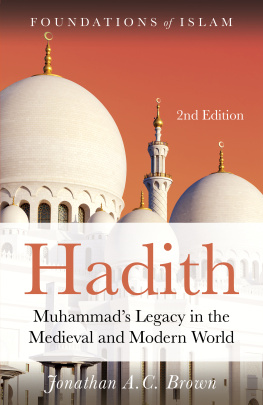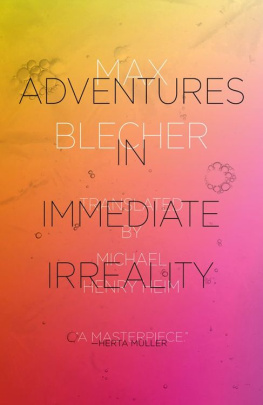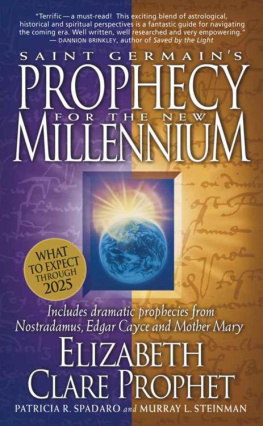Blecher - Said the prophet of God: Hadith commentary across a millennium
Here you can read online Blecher - Said the prophet of God: Hadith commentary across a millennium full text of the book (entire story) in english for free. Download pdf and epub, get meaning, cover and reviews about this ebook. City: Oakland;California, year: 2018, publisher: University of California Press, genre: Religion. Description of the work, (preface) as well as reviews are available. Best literature library LitArk.com created for fans of good reading and offers a wide selection of genres:
Romance novel
Science fiction
Adventure
Detective
Science
History
Home and family
Prose
Art
Politics
Computer
Non-fiction
Religion
Business
Children
Humor
Choose a favorite category and find really read worthwhile books. Enjoy immersion in the world of imagination, feel the emotions of the characters or learn something new for yourself, make an fascinating discovery.
Said the prophet of God: Hadith commentary across a millennium: summary, description and annotation
We offer to read an annotation, description, summary or preface (depends on what the author of the book "Said the prophet of God: Hadith commentary across a millennium" wrote himself). If you haven't found the necessary information about the book — write in the comments, we will try to find it.
Blecher: author's other books
Who wrote Said the prophet of God: Hadith commentary across a millennium? Find out the surname, the name of the author of the book and a list of all author's works by series.
Said the prophet of God: Hadith commentary across a millennium — read online for free the complete book (whole text) full work
Below is the text of the book, divided by pages. System saving the place of the last page read, allows you to conveniently read the book "Said the prophet of God: Hadith commentary across a millennium" online for free, without having to search again every time where you left off. Put a bookmark, and you can go to the page where you finished reading at any time.
Font size:
Interval:
Bookmark:

The publisher and the University of California Press Foundation gratefully acknowledge the generous support of the Ahmanson Foundation Endowment Fund in Humanities.
Joel Blecher

UNIVERSITY OF CALIFORNIA PRESS
University of California Press, one of the most distinguished university presses in the United States, enriches lives around the world by advancing scholarship in the humanities, social sciences, and natural sciences. Its activities are supported by the UC Press Foundation and by philanthropic contributions from individuals and institutions. For more information, visit www.ucpress.edu.
University of California Press
Oakland, California
2018 by Joel Blecher
Library of Congress Cataloging-in-Publication Data
Names: Blecher, Joel, 1982 author.
Title: Said the prophet of God : Hadith commentary across a millennium / Joel Blecher.
Description: Oakland, CA : University of California Press, [2017] | Includes bibliographical references and index. | Identifiers: LCCN 2017024233 (print) | LCCN 2017030890 (ebook) | ISBN 9780520968677 (Ebook) | ISBN 9780520295933 (cloth : alk. paper) | ISBN 9780520295940 (pbk. : alk. paper)
Subjects: LCSH : HadithCriticism, interpretation, etc.History.
Classification: LCC BP 136.8 (ebook) | LCC BP 136.8 . B 54 2017 (print) | DDC 297.1/251609dc23
LC record available at https://lccn.loc.gov/2017024233
Manufactured in the United States of America
26 25 24 23 22 21 20 19 18
10 9 8 7 6 5 4 3 2 1
For Summer
and
for Marc, Sharon, Ian, and Jacob
In a paradox... the commentary must say for the first time what has already been said, and must tirelessly repeat what has never been said.
Michel Foucault
Once a discussion of Bukhrs chapters began in the Shaykh al-Hinds circle... things that had not been heard or read elsewhere seemed to be in the process of being unveiled.
Manir Asan Gln
This book has made every attempt to employ English equivalents to Arabic and Urdu words when one exists. This applies to well-known figures, places, texts, and groups, like Muhammad, Osama bin Laden, Mamluk, Crdoba, Gujarat, al-Qaeda, Sunni/Shii, Salafi, and the Quran. It also applies to common nouns like hadith, sultan, and emir that are found in English dictionaries. Hadith is used in both the singular and the plural, as is English convention. In all other cases, Arabic terms have been written with standardized academic transliteration adapted from the Encyclopedia of Islam, 3rd edition, ed. Kate Fleet, Gudrun Krmer, Denis Matringe, John Nawas, and Everett Rowson (Leiden: Brill, 2007-). Plurals, with some exceptions, are typically formed by adding an s to the singular, such as ijza s (rather than ijzt ). Texts with both Arabic and Urdu are transliterated according to Arabic transliteration conventions.
For modern figures or groups with Urdu or Arabic names that have been published without standard academic transliterations, I retain their published or popular transliteration as is (e.g., Salahuddin Yusuf rather than al al-Dn Ysuf; Deobandis and Barelvis rather than Deobands and Barilws). Likewise, quotations that include Arabic or Urdu terms have been transliterated as is. The first time I mention an Arabic or Urdu name, I give the full name, and in subsequent mentions I use a short name, at which point I dispense with the definite article al- (Badr al-Dn al-Ayn, but subsequently Ayn). In the notes, which are designed for specialists, the definite article al- is retained (e.g. Nawaw in the text, but al-Nawaw in the notes). However, if the short name includes Ibn, I usually retain al- (e.g., Ibn al-Munayyir, Ibn al-Tn). Book titles are usually given in shortened form, often replacing al- with the if it is included in the first word of the title (e.g. the Muwaa ) but longer titles are generally included in the notes.
Dates have been given in both the common era and the Islamic ( hijr ) calendars up to the nineteenth century, after which only the common era date is given.
Since there are often many different printings and page numberings of hadith commentaries, I frequently append information in the notes about the book and chapter heading in the hadith collection under which a pertinent commentarial discussion can be found. This information is intended to help specialists locate the passage more quickly even if they do not have the precise edition I am citing. This information will appear in the following format: Author, Book Title, volume:page number (book title in hadith collection: chapter heading), e.g., al-Asqaln, Fat al-br, 12:175 ( Kitb al-udd: Bb kam al-tazr wal-adab ).
Lastly, the following abbreviations have been employed: the Encyclopedia of Islam, 2nd edition, edited by P. Bearman, Th. Bianquis, C.E. Bosworth, E. van Donzel, and W.P. Heinrichs, eds. (Leiden: Brill, 19602006) will be abbreviated as EI2, and the Encyclopedia of Islam, 3rd edition, will be abbreviated as EI3. The Encyclopedia of the Quran, edited by Jane Dammen McAulliffe (Leiden: Brill, 2006), will be abbreviated as EQ.
It was 2009, before the civil war. As the scorching heat of a Damascus summer day gave way to a balmy evening, a friend invited me along to al-mn Mosque to hear Shaykh Nam al-Irqss add to his line-by-line commentary on a al-Bukhr. Grabbing my pen and pad, I accepted. Sunnis popularly hold a al-Bukhr to be the most reliable collection of hadiththe sayings and practices attributed to Muhammadand their interpretation of the meanings of the hadith it contains is an event to behold. It was the seventh year of Irqsss commentary, and he was less than a third of the way through explaining the entire work.
At the mosques threshold, I removed my shoes, and I found a seat on the carpet some sixty feet away from the shaykh. Scanning the room, I made a careful observation of Irqsss students. By my count, nearly eight hundred male students had gathered there. Many local Syrians were in attendance, but a good fraction of his students were from other parts of the Islamic world, particularly Central Asia and Indonesia. Roughly half brought a personal copy of a al-Bukhr with them. Older students pored over faded editions, filled with marginal notes from prior studies. Younger students brandished sparkling new editions that conveniently included a popular medieval commentary in a smaller font below the main text, and they began adding their own margin notes for the first time. Near the back, some in attendance closed their eyes, counting their prayer beads methodically as they listened to the shaykh explain each hadith. Near the front, students clamored for the shaykhs attention, hoping to prove they could competently answer any question the shaykh might spontaneously pose to them.
While Irqsss periodic slips into Syrian dialect appeared to create an air of improvisation, his commentary was anything but. In one sitting, by capitalizing on the flexibility of the line-by-line commentary to digress into a wide spectrum of detailed discussions, Irqss carefully stitched together citations from hadith commentaries from classical Andalusia, the Mamluk era, and modern India. He also weaved in material from Quran commentaries, Islamic legal texts, historical chronicles, and biographies of the Prophet and his companions. With each explanation he exhorted his audience to pious action or elucidated a sectarian, legal, grammatical, historical, or political issue. It took Irqss from the time of the sunset prayer to the evening prayerabout an hour and a halfto recite and explain just three hadith.
Font size:
Interval:
Bookmark:
Similar books «Said the prophet of God: Hadith commentary across a millennium»
Look at similar books to Said the prophet of God: Hadith commentary across a millennium. We have selected literature similar in name and meaning in the hope of providing readers with more options to find new, interesting, not yet read works.
Discussion, reviews of the book Said the prophet of God: Hadith commentary across a millennium and just readers' own opinions. Leave your comments, write what you think about the work, its meaning or the main characters. Specify what exactly you liked and what you didn't like, and why you think so.

